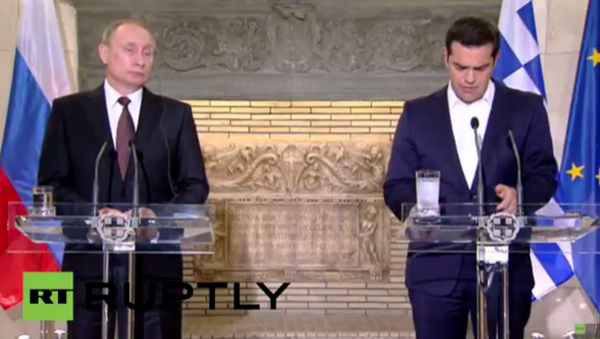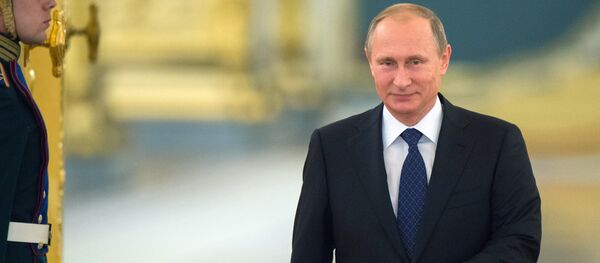The US deployment of the Aegis ashore ballistic missile defense system (BMDS) in Romania has had a negative impact on relations between Russia and the West, Russian President Vladimir Putin said on Friday.
Last week, the United States activated its Aegis BMDS in Romania and broke ground on another Aegis ashore site in Poland.
"[The deployment] has a negative impact. This cannot have any other impact, because the United States have at one point unilaterally withdrawn from the Anti-Ballistic Missile Treaty, and have, in essence, begun undermining the fundamentals of international security," Putin said during a press conference at the close of a meeting with Greek Prime Minister Alexis Tsipras in Athens.
Another step toward undermining security has been taken, he stressed, noting that Russia had been warning of being forced to react in some way since the early 2000s.
"No one listens to us. No one want to hold talks with us. We are not hearing anything except general phrases. General phrases consist of stating that this is not directed against Russia, that this is not a threat to Russia. I will note that previously, the nuclear threat from Iran was being countered, the Iranian nuclear program was involved. Where is the Iranian nuclear program now? It does not exist," he added.
On Crimea, Savchenko
Putin said that the issue of Crimea's rejoining Russia is decisively closed and will not be negotiated.
He was commenting on Ukrainian President Petro Poroshenko's remark on Wednesday that Kiev would reinstate its control over the country's southeastern breakaway regions of Luhansk and Donetsk, as well as over Russia's Crimean Peninsula, just as Ukrainian servicewoman Nadezhda Savchenko was recently repatriated from Russia.
"Regarding Crimea, then we think that this issue is decisively closed. This is a historical decision of the people living in Crimea, and Russia will not hold any discussion on the matter," Putin told reporters in Athens.
Further, Russia's release of Ukrainian military officer Nadezhda Savchenko was not related to the Minsk accords. Putin stressed.
In March, Savchenko received a 22-year prison sentence after being convicted in a Russian court of directing artillery that killed Russian journalists Igor Kornelyuk and Anton Voloshin in eastern Ukraine in 2014. On Wednesday, Putin signed a decree to pardon Savchenko.
"The widow and sister [of the Russian journalists] have written letters to me, asking to free Savchenko. This was the main thing. This has nothing to do with the Minsk accords. Because the Minsk accords deal with those imprisoned in Donbas and those taken from Donbas and imprisoned in Ukraine," Putin said.
Russia is willing to resume relations with Turkey despite last year's downing of the Russian Su-24 jet over Syria, but Ankara must act first to mend ties, Putin said.
"We heard accusations from Turkish authorities, we did not hear apologies. And we did not hear of any readiness to compensate the loss. We hear statements on the willingness to resume [relations]. We also want to resume relations, we did not dismantle them. We have done everything over the decades to take Russian-Turkish relations to an unprecedented level of partnership and friendship. And this friendship between the Russian and Turkish peoples has, in fact, reached a very high level. We valued this greatly."
Russia await concrete steps by the Turkish side, he added, noting that contacts are being maintained and that Ankara knows what Russia expects.
On energy cooperation with Greece
The South Stream gas pipeline project for delivering Russian gas to Europe, was suspended by Bulgaria in 2014 over EU objections.
"We are ready to look into any project regardless of the backdrop in political relations with any country in Europe, with our neighbors. We are ready to implement any project. But we need to secure guarantees first. We will not buy into simply promises of large mutual benefits, and we will not spend money on this," Putin said.
Russia has suffered certain losses having invested funds in preliminary works for the South Stream project, he added.
"But now, we intend to implement the Nord Stream 2, and I hope that at least this project will not be obstructed by anyone. However, this does not mean that were are not prepared to work in the South of Europe," he stressed.





